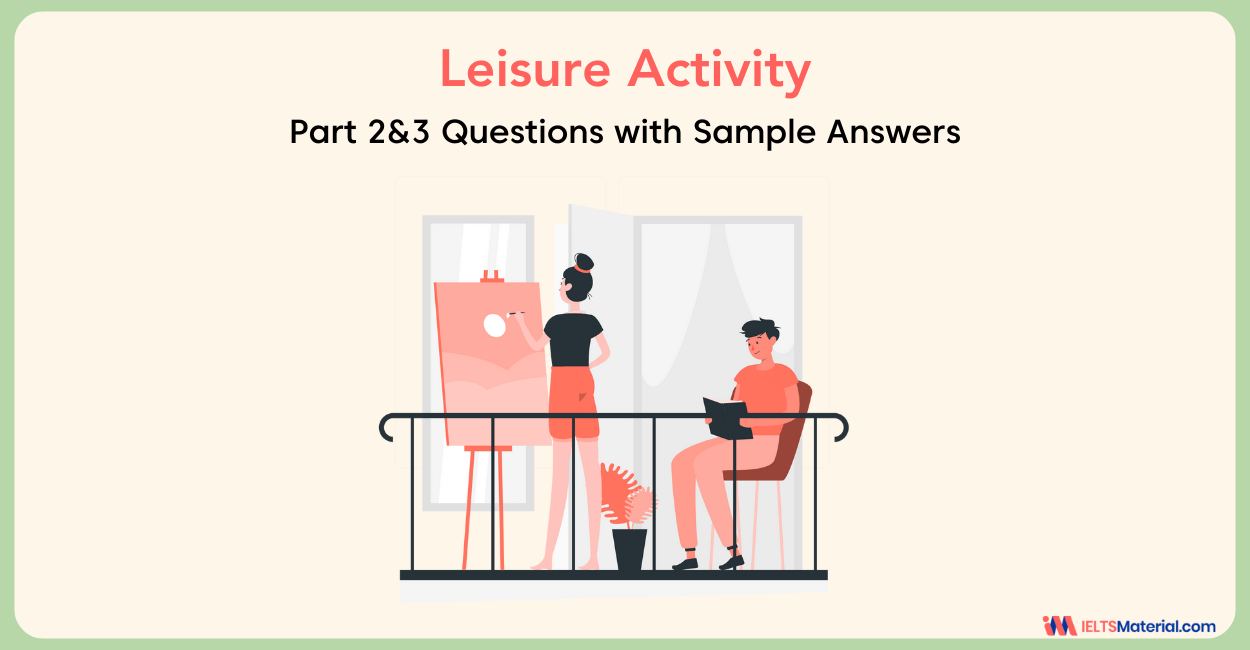Daily Routine: IELTS Speaking Part 1, 2 & 3 Sample Answers
11 min read
Updated On
-
Copy link
This article is based on the IELTS speaking topic 'Daily Routine.'
Table of Contents
- Daily Routine IELTS Speaking Part 1
- Daily Routine IELTS Speaking Part 2 – Cue Card
- Daily Routine IELTS Speaking Part 2 Sample Answer 1
- Daily Routine IELTS Speaking Part 2 Sample Answer 2
- Daily Routine IELTS Speaking Part 2 Vocabulary
- Daily Routine IELTS Speaking Part 3
- Daily Routine IELTS Speaking Part 3 Vocabulary

Get a Complimentary IELTS Speaking Strategies PDF
A daily routine is a common topic that everyone has, so it’s not surprising if you encounter questions about it during the IELTS Speaking exam. These questions could appear in Part 1, Part 2, or Part 3 of the test. While discussing daily routines is often seen as straightforward, it can also be perceived as mundane. Although it’s generally easy to describe or invent details about your daily routine, expressing them fluently can be challenging, which is crucial for the IELTS Speaking test.
Therefore, while your responses about your daily routine will naturally come from your personal experience, this blog aims to help you understand the types of answers you should provide and the IELTS Vocabulary you should use to achieve an IELTS Band Score of 8 or higher.
Aiming for a high Speaking score? Take a look at the expert tips and tricks below!
Daily Routine IELTS Speaking Part 1
Let’s start practising with some sample responses to the daily routine IELTS Speaking Part 1 now!
- When do you wake up?
Well, I’m a morning riser, and I wake up at about 5 o’clock. Getting up early not only makes me feel refreshed and productive but also prevents my skin from having wrinkles.
- What is your daily routine?
Well, in the morning, I get up early to have a light breakfast and hit the gym at about 8 a.m. After one hour of workout, I leave the gym club and go to the supermarket to buy food to prepare lunch and dinner. In the afternoon and evening, I go to my workplace and start working from 14.00.pm until 21.00.p.m.
- What part of the day do you like most?
I enjoy it late at night when I come home from work, and everything is filled with dim grey light. To me, it’s a great time to kick back on the bed to chit-chat with my roommates, surf the Internet, listen to music, or watch a favourite movie.
- Do you think having a daily routine is boring?
No, I don’t think that having a daily routine is boring because a proper schedule will help you arrange your activities more sensibly, every day.
- What’s the difference in routine between you and your teenage times?
Well, I can say that there’s a vast difference between my life then and my present life. You know, when I was a teenager, besides focusing on study, I had much free time to pursue my interests like watching films or listening to music. In contrast, my routine and time management have become stricter now. Since I graduated from university and began working as an English teacher, I’ve been so occupied with my work that I have little leisure time.
Here are the types of questions that are asked during IELTS Speaking Part 1
- What is the busiest part of the day for you?
Afternoons are the busiest time of the day for me. I work for a UK company and my day starts at 2:00 PM. So by 3:00 PM I will be bombarded with client calls and emails and will have no time to breathe.
- Do you usually have the same routine every day? (or) Do you usually do the same things at the same time each day?
Mostly yes. I’m an early bird though I go to bed late. On weekdays, my work starts at 2:00 PM and I wind up by 11:00 PM. On weekends, I go shopping and sleep a little early. I follow this schedule every week and there aren’t any major changes unless we have celebrations.
- Have you ever changed your routine?
Yes, it changed about a month ago. I had a very tight schedule and was struggling to manage my targets. So I had to work late until 2:00 AM.
- What would you like to change in your daily routine?
My work starts at 2:00 PM. So I lazed around until then. I want to use that time productively. Some of my friends go to the gym and I would like to start an exercise regime as well.
- Do you like to plan what you will do each day?
Yes, I would like to. Planning keeps the day in your control. The more organized you are, the better your life becomes. I’m pretty orderly at work and I want to be the same way in my other activities as well.
- What do you usually do at this time of day?
[Assuming it is morning] It is 10:30 AM now. You can find me watching television or reading a magazine. Sometimes I go out and talk to my friends.
- How do you organize your study time?
I’m pursuing a course in Management along with my work. I usually study on the weekends because I want an entire day to myself. I don’t study on weekdays as it becomes stressful.
- How important is it to have a daily routine?
I believe it is very important to have a daily routine as it helps one build habits. Without a daily routine, people usually do things spontaneously, which could waste their time and reduce their work efficiency. I think those who are disorganized can gain more benefits from creating a daily routine.
Eager to brush up on your speaking skills with the ‘Daily routine’ IELTS Speaking topic? Book a FREE trial to practice!
Daily Routine IELTS Speaking Part 2 – Cue Card
You will receive a task card in IELTS Speaking Part 2 that asks you to explain a situation or a topic. There will then be three to four questions on the topic, such as the one below.
Describe an occasion when you got up very early.
You should say :
- When did it happen?
- Why did you get up early?
- Who were you with?
- Explain how you felt about getting up early.
Daily Routine IELTS Speaking Part 2 Sample Answer 1
When did it happen?
I’m a night owl who usually gets out of bed quite late, ranging from 9 am to 10 am every morning. However, there were some occasions when I was forced to get up early, and I still remember the last time that I had to get up soon. In September of last year, I was offered the first job in my life and at that time I was made to get up early, I will elaborate on this now.
Why did you get up early?
At that time, I was a fresh graduate. Thus I had to move to X city to join training sessions at the Head Office of the company. My supervisor booked the flight ticket. Unfortunately, she had no choice but to book an early flight for me at 6 a.m. As I received the ticket information, I was quite anxious about whether I would miss the flight or not. I set off the alarm on my phone and asked my mother to wake me up in time.
Who were you with?
My flight was with my supervisor and he arrived at the airport way sooner before me. We both waited for the other three team members to arrive and we all were able to board the flight together on time.
Explain how you felt about getting up early.
Finally, I made it, though I felt so sleepy. I fell asleep as soon as I was on the plane. It was such a frightening experience as it was the first time I went on a plane, dealing with all kinds of stuff at the airport in the early morning on my own. Luckily, some kind people were willing to help me with my suitcase, which made that experience less difficult for me. As a youngster, I was in the habit of staying late at night and getting up late, too. However, I feel I should change this custom to improve my health.
Shy to start speaking in English? Let us help you boost your skills now! FREE IELTS Speaking Demo
Daily Routine IELTS Speaking Part 2 Sample Answer 2
When did it happen?
I am from the lot who love burning the night owl. For me, it is easier to stay awake till late than to get up early in the morning. However, there was this one time when I had to get up quite early. I got up at 4 am, even before dawn and the time was last summer.
Why did you get up early?
During summer, my family had planned a weekend trip to Rishikesh, a beautiful city located in Uttarakhand. My father is exceptionally disciplined and an ardent follower of time. He doesn’t like anybody wasting even a second. Thus, he decided that we were to have a road trip that commenced at 6 am.
Who were you with?
At sharp 6 am, all of us – I, my sister, and my parents began our journey. The early start was indeed a plus point as it gave us extra time to spend in Rishikesh, indulging in varying activities.
Explain how you felt about getting up early.
While the timing was a bit of a disappointment, the entire idea of a road trip to Rishikesh was the highlight that kept me exhilarated. So, I desperately tried sleeping early on a Friday night but to no avail. Anyway, I still managed to wake up at 4 in the morning on a Saturday, which was pretty unusual for me. Owing to this journey, I realized the importance of getting up early.
Get a hold of the important linking words for IELTS Speaking here!
Daily Routine IELTS Speaking Part 2 Vocabulary
In IELTS Speaking Part 2, a rich vocabulary helps you provide detailed and vivid descriptions, making your response more compelling and memorable.
- On a regular basis
Meaning: At the same time every day, week, month, etc.
Eg: The sales team meets on a regular basis.
- Fresh graduate
Meaning: a person who has just graduated recently
Eg: A fresh graduate often has difficulties in applying for jobs, as he has no experience.
- Have no choice but to
Meaning: the last thing anyone can do
Eg: As the rain was hard, we had no choice but to cancel the plan.
- Deal with
Meaning: to take action to do something, especially to solve a problem
Eg: The government must now deal with the problem of high unemployment
- Youngster
Meaning: a child, young person, or young animal.
Eg: Members are organizing a transport survey to find out how youngsters get to school.
- Disciplined
Meaning: Showing a controlled form of behaviour or self-control, often adhering to rules or routines.
Eg: After years of disciplined training and strict dieting, she finally achieved her goal of running a marathon.
- Disappointment
Meaning: A feeling of sadness or dissatisfaction when one’s expectations are not met or something desired does not happen.
Eg: Feeling a sense of disappointment, she realized that the movie she had been looking forward to seeing was sold out.
- Anxious
Meaning: Feeling nervous or worried about something that is going to happen.
Eg: She felt anxious about her upcoming presentation, fearing she might forget important points.
- Supervisor
Meaning: A person who oversees or manages the work of others, typically in a professional or organizational setting.
Eg: Her supervisor provided valuable guidance and support as she adjusted to her new role in the company.
Also check :
- IELTS Speaking preparation tips
- Linking words for IELTS Speaking
- IELTS Speaking recent actual test
- IELTS Speaking Part 3 Topics
- Idioms for IELTS Speaking
Daily Routine IELTS Speaking Part 3
Look at the Daily Routine IELTS Speaking Part 3 questions related to the daily routine cue card and develop your own sample answers.
- Do you think people need to have a day-to-day plan? | Do you think people can still do their tasks if they don’t plan them?
Yes, because a day-to-day plan is key to effective time management. If you have a clear plan for the day, you can make the most of your time and accomplish other tasks of the day. In my opinion, not everyone needs a plan. Few can still do their daily tasks without a plan.
- Do you think it is possible to learn how to manage your time?
Yes! I plan my tasks for the day and implement them accordingly which helps me to manage my time. One can learn to manage their time by setting goals and prioritizing them wisely. It’s better to set a time limit for each task and complete them at the earliest.
- What are some possible advantages of using a time management app for your phone to help you plan your time?
Some of the possible advantages of time management apps are that we can quickly review the profitability of our projects, prioritize and deliver work on time, reduce our stress levels, make bill payments on time, and so on. The time management app can be ideal for understanding all the extra budgets as well. Hence, they are productive and effective.
- Why do you think some people don’t plan their day in advance?
Some people avoid planning their day in advance because they are worried that their plan won’t work or is not good enough. While some people are good at making a plan, they procrastinate when it comes to implementing the same.
- Why do some people go to sleep late at night?
Many individuals, like myself, prefer staying up late, and this preference may start from finding an increased concentration and productivity during the night hours compared to mornings. Additionally, factors such as insomnia or other health concerns might disturb the sleep patterns of some and spoil their daily routine.
Read more about the common English words in IELTS Speaking to stand out from the crowd!
Daily Routine IELTS Speaking Part 3 Vocabulary
For Part 3, advanced vocabulary is essential for discussing complex ideas and providing well-rounded answers, showcasing your ability to engage in in-depth conversations.
- Effective
Meaning: successful or achieving the results that you want
Eg: The coronavirus vaccine is effective.
- Prioritize
Meaning: organize (things) so that the most important thing is done or dealt with first.
Eg: It’s always difficult to prioritize between work, school, and family.
- Productive
Meaning: causing or providing a good result or a large amount of something
Eg: We had productive results after implementing the new idea
- Accomplish
Meaning: achieve or complete successfully.
Eg: Rose accomplished her dream of becoming a pilot.
- Stress
Meaning: a feeling of emotional or physical tension which can come from any event.
Eg: My mother was stressed about the incident.
- Procrastinate
Meaning: To delay or postpone action, often out of reluctance or indecision.
Eg: Instead of starting his assignment right away, he chose to procrastinate by watching TV.
- Insomnia
Meaning: A sleep disorder characterized by difficulty falling asleep or staying asleep, leading to inadequate rest and often resulting in daytime fatigue.
Eg: She struggled with insomnia for months, finding it nearly impossible to get a good night’s sleep.
With the given expert-crafted sample answers for the IELTS Speaking parts 1, 2, and 3 related to ‘Daily routine,’ you would have been able to practice this topic more efficiently! For a band 9 in your speaking test, practice more of the latest IELTS Speaking topics like this consistently!
IELTSMaterial is Here to Help You Grab a Band 9 in IELTS Speaking
The IELTS Speaking test involves more than just being fluent and confident. You are expected to express your ideas concisely, use a variety of language, and proper grammar. Achieving all these on your own by just practising test papers might be a little challenging. So, you can connect with our IELTS experts or join the FREE webinars for tips to take your IELTS Speaking preparation to the next level!
Also check:
Explore IELTS Speaking

Bonus IELTS Speaking part questions with Answers
Explore other Speaking Topics

Janice Thompson

Raajdeep Saha
Recent Articles

Janice Thompson

Raajdeep Saha

Raajdeep Saha







Post your Comments